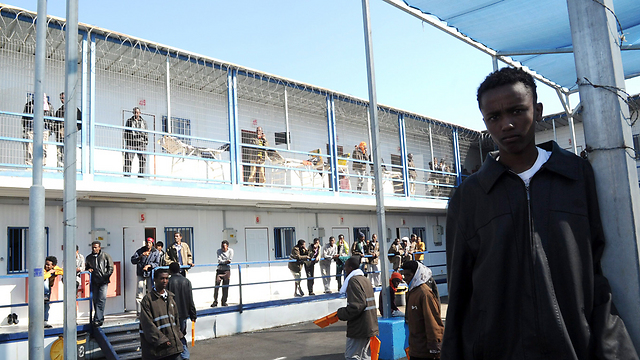After Israel’s High Court of Justice strikes down law allowing State to detain illegal infiltrators for up to 3 years without trial, Justice Ministry review panel asks for immediate release of Eritrean woman jailed since 2012
By Omri Efraim
The Justice Ministry’s Custody Reviews Court has ordered the release of an Eritrean woman held in detention in wake of the High Court’s ruling that the amendment to the Prevention of Infiltration Law that allows the detention of infiltrators for up to three years without trial is unconstitutional.

Saharonim detention facility – Archive photo: Hain Hornstein
The woman is the first person to be released as a result of the ruling. She has been held in the Saharonim detention facility without trial since 2012.
The woman’s case was brought before the review court at the request of the Interior Ministry, which requested that the court annul a decision to release the woman on the grounds that her asylum request was rejected by the ministry.
However, Judge Raja Marzuk decided to uphold the decision to release her, claiming that because of the High Court ruling – which struck down the Prevention of Infiltration Law amendment – her case must be judged in accordance with the Entrance to Israel Law.
Related:
In the ruling regarding the Eritrean woman, the judge claimed that in light of the fact that she arrived from a country to which she cannot be returned constitutes valid justification for her release on humanitarian grounds.
The judge noted that “a few hours prior to the (Interior Ministry’s) request, a ruling was handed down by the High Court.” As a result, the judge stated the ruling had bearing on the woman’s case, and hence, according to the Entrance to Israel Law “there are several reasons to release the detainee.”
The decision is likely to bear major legal consequences on any future hearings of the additional 1,811 refugee seekers and illegal migrants held without trial at the Saharonim detention facility. There is also a possibility the court will rule that all those held on the basis of the Prevention of Infiltration Law amendment are to be released.
On Monday, an expanded panel of nine High Court justices unanimously ruled against the amendment, claiming it disproportionately harms the constitutional right to freedom set forth in the Basic Law: Human Dignity and Liberty.
Reut Michaeli, director of the Hotline for Migrant Workers, welcomed the court’s decision, and said: We hope this is the first of many (rulings) to come. In accordance with the High Court decision, the Interior Ministry must examine and reach a decision in the cases of all those jailed within 90 days. I can only hope the ministry will not drag its feet and will release them immediately.”
Meanwhile, the State seems to be having difficulty coming to grips with the court’s ruling.
“We succeeded in decreasing the number of infiltrators and are worried that there will be a renewal of the phenomenon of the arrival of new infiltrators,” Amnon Ben Ami, director of the Population, Immigration and Borders Authority, said at the meeting of the Interior Committee of the Knesset, which discussed the amendment’s nullification.
“The crux of our plan was this amendment. After the Attorney General okayed the return to the implementation of the ‘willful emigration‘ directive, the government began deporting hundreds of them monthly to a third country, but the plan worked only with the Prevention of Infiltration Law. The secretary of the United States Department of Homeland Security said – don’t trust the fence, and they have experience in this field in the US.”
View original Ynet publication at: http://www.ynetnews.com/articles/0,7340,L-4430962,00.html






 Israeli New Shekel Exchange Rate
Israeli New Shekel Exchange Rate